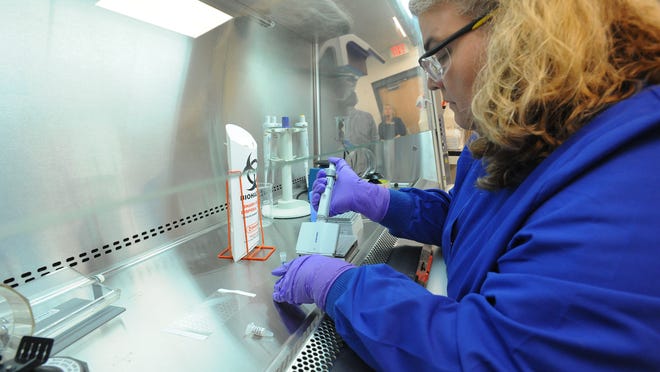A Kent County commercial broiler farm in Delaware was the latest location to have a positive case of highly pathogenic H5N1 avian influenza.
An investigation by the Delaware Department of Agriculture and the U.S. Department of Agriculture’s National Veterinary Services Laboratory confirmed the case through federal laboratory testing on Thursday.
“State officials have quarantined all affected premises, and the birds have been depopulated to prevent the spread of the disease. Birds from affected flocks will not enter the food system,” said the Delaware Department of Agriculture in a statement.
BIRD FLU:Testing confirms new Maryland, Delaware cases, first in broiler flock
MORE ON BIRD FLU:What bird flu could mean for your budget and your health
This joins cases in recent weeks on farms in New Castle County, Delaware, and Cecil and Queen Anne’s Counties, Maryland.

As a result, federal and state partners have expanded their surveillance sampling and testing regimen to better protect the poultry industry on the Delmarva Peninsula.
“Avian influenza is a highly contagious airborne respiratory virus that spreads quickly among birds through nasal and eye secretions and manure,” the department said. “The virus can be spread in various ways from flock to flock, including by wild birds, through contact with infected poultry, by equipment, and on the clothing and shoes.”
How to protect yourself from bird flu
The Centers for Disease Control and Prevention also notes risk to humans is very low. Properly handling and cooking poultry and eggs to an internal temperature of 165 degrees kills bacteria and viruses, including bird flu viruses, the CDC website states. People should handle raw poultry hygienically.
Backyard flock owners in Delaware who notice any of the signs of avian influenza in their flock should email the Delaware Poultry Health Hotline at poultry.health@delaware.gov or call 302-698-4507 and provide contact information, size of flock, location and concerns.
In Maryland, report any unusual or sudden increases in sick birds to the MDA Animal Health Program at 410-841-5810. Commercial chicken growers and backyard flock owners can email questions about the outbreak to MD.Birdflu@maryland.gov.
DELAWARE BACKGROUND:Bird flu found in Delaware commercial chicken flock; how you can protect yourself
The department strongly suggests the following:
- Do not harvest or handle wild birds that are obviously sick or found dead.
- Do not eat, drink or smoke while cleaning game.
- Wear rubber gloves while cleaning game or cleaning bird feeders.
- Wash hands with soap and water immediately after handling game or cleaning bird feeders.
- Wash all tools and work surfaces with soap and water.
- Avoid food cross-contamination. Keep uncooked game in a separate container, away from cooked or ready-to-eat foods.
- Cook game meat thoroughly; poultry should reach an internal temperature of 165 °F to kill disease organisms and parasites.